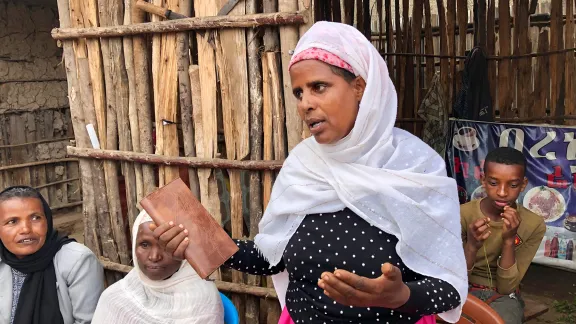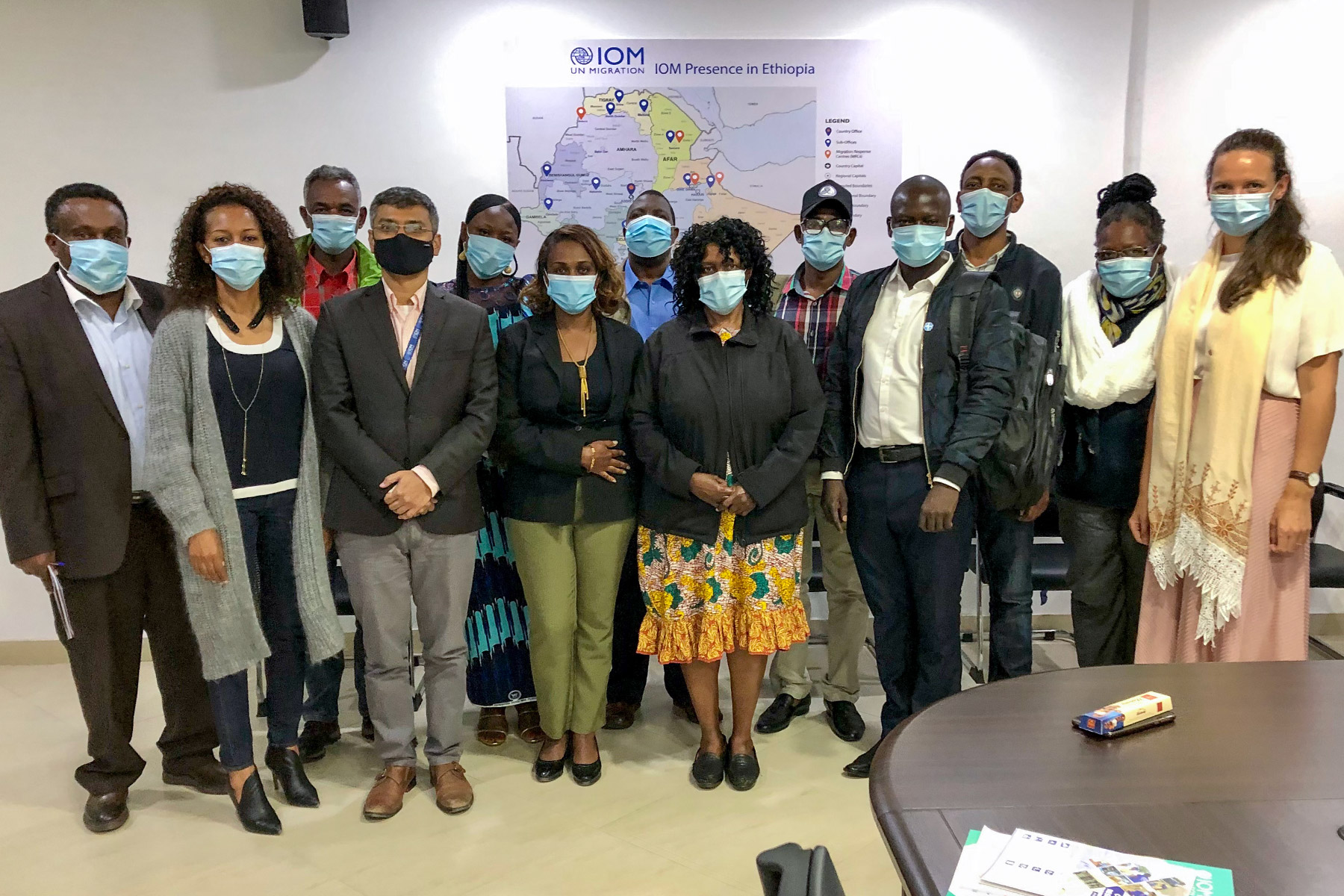
A member of a Symbols of Hope Ethiopia women's self-help group in the southern region of Hosaena, sharing her experiences. Photo: LWF/M. Dölker
Lutheran church representatives reflect on first Symbols of Hope exchange visit
(LWI) – Representatives of churches participating in the Symbols of Hope initiative have emphasized the critical role of faith communities in stopping irregular migration and providing local approaches to economic empowerment and overcoming poverty.
The Lutheran World Federation (LWF) started Symbols of Hope in 2017 with two of its member churches—The Ethiopian Evangelical Church Mekane Yesus (EECMY) and the Lutheran Church of Christ in Nigeria (LCCN). In 2020, the Evangelical Lutheran Church in Zimbabwe (ELCZ) joined the global initiative whose goal is to empower churches to respond effectively to the challenges surrounding irregular migration and human trafficking.
Ethiopia hosted the first joint learning and experience exchange from 31 August to 3 September, with participants from ELCZ, LCCN, the LWF Communion Office and the EECMY Development and Social Services Commission (DASSC) visiting projects in Symbols of Hope projects in the country. Some of the team members shared their impressions, following visits to project sites in Hosaena in the southern zone of Hadiya, where the church has been supporting vulnerable women—potential migrants as well as returnees—with livelihoods training, in-kind support (such as vegetable seeds and goats) and self-help group savings’ schemes. The visitors also held discussions with congregation pastors, and with the national officials of the International Organization for Migration (IOM).

The visiting group with IOM Ethiopia officials. Photo: LWF/M. Dölker
“The implementation of Symbols of Hope activities has changed the church narrative in Ethiopia,” observed Rev. Emmanuel Subewope Gabriel, Symbols of Hope Nigeria national coordinator. “I learnt that before the project started, Lutheran church members and even pastors were encouraging irregular migration due to poverty and lack of information on the risk of irregular migration and human trafficking. Congregation members provided financial support for people to travel out of the country in search of better work opportunities,” he said.
“Today, EECMY pastors have taken the issue of irregular migration to the pulpit. They raise awareness on the dangers involved. There are many trained pastors to offer support and counseling to those who became victims of human trafficking throughout their journeys,” noted Ms Bongiwe Mavuwa, thematic advisor for Justice and Peace at the ELCZ Lutheran Development Service (LDS), which runs Symbols of Hope Zimbabwe.
Today, EECMY pastors have taken the issue of irregular migration to the pulpit. They raise awareness on the dangers involved. There are many trained pastors to offer support and counseling to those who became victims of human trafficking.
Collaboration with like-minded organizations stood out as a key strength. Gabriel commended Symbols of Hope Ethiopia for its partnerships with the IOM and government institutions. “The relationship is so impressive to the extent that they [IOM] are supporting faith-based organizations in staff capacity building and funding,” he said.
In Nigeria, the Symbols of Hope project includes livelihoods support for returnees and potential migrants, awareness raising campaigns with schools and transport companies, and partnerships with relevant government and non-governmental organizations. At the Bronnum Lutheran Seminary in Yola, Gabriel has begun teaching a new course on irregular migration and human trafficking, which the LCCN initiated to offer its clergy and other churches a theological framework to the issue.
Different approaches for tangible impact
The Symbols of Hope Zimbabwe project though still in its early beginnings, is concentrated in the southeastern districts of Chiredzi and Insiza that are affected by the irregular migration of mostly youth and women to neighboring South Africa. Reflecting on lessons from Ethiopia that could apply to her context, Mavuwa referred to a goat-rearing revolving loan scheme among the women’s groups. “We liked the fact that individuals are initially given five goats and [after they reproduce] have to return two goats to the project to ensure the pass-on takes place. The number of goats is significant to enable each person to start off well. If individuals are left to pass on the goats on their own, the project does not go well.”
That each group member receives direct assistance in crops and vegetable seeds, which they can market later is an added advantage, Mavuwa noted. “Individuals can work on their own rather than in a group whereby some might not work hard and thereby bring down the whole group.” The village market from 16:00 hours to 18:00 hours is another incentive. “It enables the women to sell every day after doing other household chores.”

Women from one of the self-help savings’ groups selling spices at the market in Hosaena. Photo: LWF/M. Dölker
Churches bring added value
“The exchange visit was a wonderful experience for us to gather good practices in the three countries,” said Ashenafi Haile, Symbols of Hope Ethiopia project coordinator and EECMY-DASSC livelihoods program officer. The broad outreach and local connectedness of churches through congregational structures enables them to address risks surrounding irregular migration in areas with limited access for international organizations or government authorities, he noted.
By August 2021, the Symbols of Hope awareness raising efforts in Ethiopia had reached more than 36,200 potential migrants (22,000 female, 14,200 male). Members of the self-help women’s groups are among 400 returnees (330 female, 70 male) and 100 potential migrants (55 female, 45 male) who have received training for sustainable small-scale businesses. In addition, over 400 religious leaders, pastors and diaconal workers (100 female, 300 male) have received capacity training to provide psychosocial support.
LWF Program Executive for Diakonia and Development Ms Marina Dölker represented the Communion Office, and she recalled the concluding conversations with one of the women’s self-help groups. “At the end of our conversation, one of the women got up and started talking in her local language. We did not understand, but from her body language and voice we could see how passionate she was, repeatedly pointing to the local church project staff, then moving her hands toward her heart. It was later translated that she was thanking the church for its support and loyalty, saying Symbols of Hope had enabled the women to regain dignity and establish trust among themselves and with project staff who are themselves members of the local community.”

One of the women sharing her experiences during a conversation with the Symbols of Hope visitors. Photo: LWF/M. Dölker
The self-help groups have become a safe space for the women to not only share about their traumatic experiences, but to also advise each other on the challenges they face in their daily lives, Dölker added. “Even after the project period ends, the women stay united as a group and continue their joint savings and mutual support —a truly sustainable approach.”
By LWF/P. Mumia
The LWF Symbols of Hope initiative started in July 2017 in collaboration with the communion’s member churches in Ethiopia and Nigeria, responding to the high numbers of people from Africa in particular who were migrating to Europe and the Middle East using irregular means. In 2020, the church in Zimbabwe joined the initiative, through which churches raise awareness among potential migrants, and share accurate information about irregular migration and the risks involved. They also provide psychosocial support to returnees including victims of human trafficking, offer vocational training and livelihoods support for sustainable income sources.


